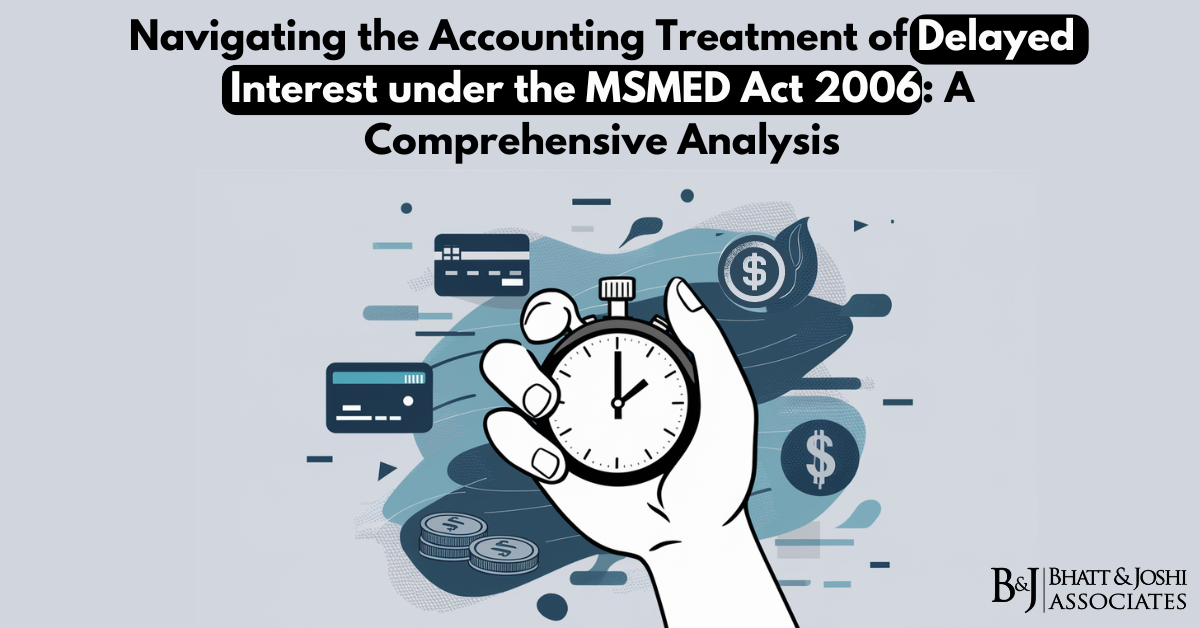Accounting Treatment of Delayed Interest under the MSMED Act 2006: Navigating a Comprehensive Analysis
Introduction:
The Micro, Small, and Medium Enterprises Development Act, 2006 (MSMED Act) serves as a cornerstone in fostering the growth and development of micro, small, and medium enterprises (MSMEs) in India. One of the pivotal aspects of this legislation is ensuring timely payments from buyer entities to MSME suppliers, thereby bolstering the financial health and sustainability of these crucial economic contributors. However, delays in payments are not uncommon in commercial transactions, and the MSMED Act provides provisions for the imposition of interest on delayed payments to incentivize adherence to payment timelines. Despite the statutory framework delineating the obligations of buyers and the rights of suppliers, questions abound regarding the accounting treatment of interest payable in cases of delayed payments, particularly when suppliers opt to waive such interest. This article embarks on a journey to explore the multifaceted dimensions of the accounting treatment of delayed interest under the MSMED Act, delving into legal intricacies, accounting standards, and practical implications for buyer entities and MSME suppliers alike.
Understanding the Legal Framework:
At the heart of the MSMED Act lies the imperative of ensuring prompt payment to MSME suppliers by buyer entities. Section 15 of the Act stipulates the timeline within which buyers must settle their dues to suppliers, emphasizing adherence to agreed-upon payment terms or defaulting to the statutory timeline if no agreement exists. Notably, the Act imposes a maximum payment period of 45 days from the date of acceptance or deemed acceptance of goods or services. Failure to comply with these payment obligations triggers the application of interest on the outstanding amount, as elucidated in Section 16. This provision mandates the payment of compound interest, calculated at three times the bank rate notified by the Reserve Bank of India, with monthly rests. Furthermore, Section 17 delineates the mechanism for the recovery of amounts due, underscoring the buyer’s liability to pay the principal amount along with accrued interest.
Can Interest Waivers Be Enforced?
Amidst the statutory provisions governing interest accrual on delayed payments, the question arises: can suppliers waive their right to interest, and if so, what are the implications? The preamble to the MSMED Act underscores its overarching objective of facilitating the promotion, development, and competitiveness of MSMEs. Judicial interpretation, exemplified in the case of Kotak Mahindra Bank Limited vs Girnar Corrugators Pvt. Ltd CA 6662 of 2022, reinforces the legislative intent behind the Act. The Supreme Court’s verdict elucidates that while the Act provides a robust mechanism for recovering delayed payments, including interest, it does not preclude suppliers from voluntarily waiving their entitlement to interest. However, it is imperative to distinguish between the right to waive interest and the right to enforce payment of the principal amount. Waiving interest does not extinguish the buyer’s obligation to pay the principal sum owed to the supplier. Thus, the supplier retains the right to pursue recovery of the principal amount even if interest is waived.
Accounting Treatment of Delayed Interest under AS 29 or Ind AS 37
As the legal landscape elucidates the permissibility of interest waivers by suppliers, attention shifts to the accounting treatment of such waivers. Accounting Standard 29 (AS 29) and Indian Accounting Standard 37 (Ind AS 37) offer guidance on recognizing and measuring provisions and contingent liabilities. AS 29 defines provisions as liabilities of uncertain timing or amount, necessitating a substantial degree of estimation for measurement. On the other hand, Ind AS 37 aligns with international accounting standards, outlining provisions as present obligations arising from past events, where settlement entails an outflow of economic resources embodying benefits. Contingent liabilities, under both standards, entail possible obligations contingent upon uncertain future events.
Analyzing the Impact of Interest Waivers:
Interest waivers by suppliers pose intricate challenges in determining the appropriate accounting treatment under AS 29 or Ind AS 37. In scenarios where suppliers unconditionally waive interest without imposing any terms or conditions, the probability of outflow diminishes, rendering the creation of provisions or disclosure of contingent liabilities unnecessary. However, when waivers are subject to conditions, such as maintaining future business transactions with the supplier, a nuanced assessment of the probability of non-adherence becomes imperative. Such conditions introduce an element of uncertainty, warranting careful consideration of whether provisions or disclosures are warranted based on the likelihood of non-compliance.
Conclusion: Navigating Delayed Interest Under the MSMED Act
In conclusion, navigating the accounting treatment of delayed interest under the MSMED Act necessitates a nuanced understanding of legal provisions, accounting standards, and practical implications for stakeholders. While suppliers retain the prerogative to waive interest on delayed payments, buyer entities must remain cognizant of their obligation to settle the principal amount owed. The application of AS 29 or Ind AS 37 hinges on the nature of interest waivers and the attendant probability of outflow, underscoring the importance of judicious assessment in financial reporting. As buyer entities grapple with the complexities of compliance and working capital management, a holistic approach that integrates legal, accounting, and operational considerations is indispensable for fostering transparency, accountability, and sustainability in commercial transactions governed by the MSMED Act.
 Whatsapp
Whatsapp


